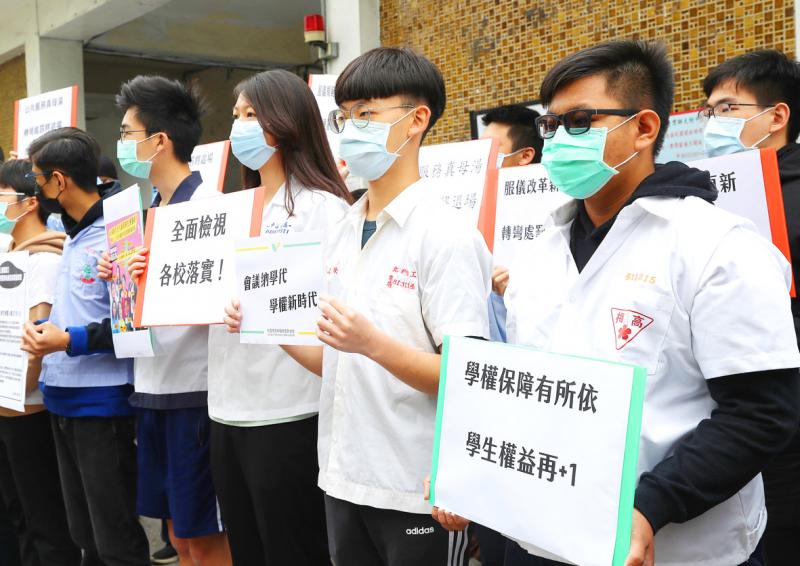More than 2,300 students have signed a petition urging the Ministry of Education (MOE) to ensure that schools do not penalize students for dress code violations, as the ministry prepares new guidelines, organizers said yesterday.
The petition was launched on Wednesday by the Taichung Child and Youth Representative, the KH Student Union and the National Students’ Rights Seminar in Taiwan, and has been backed by more than a dozen groups, including the Taiwan Youth Association for Democracy, the Humanistic Education Foundation and the Taiwan Alliance for Advancement of Youth Rights and Welfare.
“On President Tsai Ing-wen’s (蔡英文) first day in office in 2016, the Ministry of Education held a news conference to say that schools cannot use attire as reason to penalize students,” the organizers said.

Photo: CNA
“However, over the past four years, most schools have still applied ‘roundabout penalties’ for dress code violations by assigning community service or campus service or by other means,” they said.
The ministry last week proposed new guidelines that, if approved, would no longer allow schools to assign “public service” to students who break the dress code, the groups said.
The draft also states that at least one-third of dress code committee members at senior-high schools should be students and calls for schools to review their dress code policies every three years, they said.
The groups said that they hope the ministry could ensure that if the new guidelines are passed, schools will actually follow them.
The petition has five demands: immediate implementation of the new guidelines; clear indication of which alternative measures schools can take if the code is contravened; supervision of schools following the guidelines’ implementation; assurance that student representatives have real influence over dress-code policy decisions; and the inclusion of student opinions in the formation of dress policies at the elementary-school level.
A dozen lawmakers — including Democratic Progressive Party Legislator Fan Yun (范雲), Taiwan People’s Party Legislator Lai Hsiang-ling (賴香伶), New Power Party Legislator Chiu Hsien-chih (邱顯智) and independent Legislator Freddy Lim (林昶佐) — have signed the petition, organizers said.
Students and group representatives yesterday gathered outside the Affiliated Senior High School of National Taiwan Normal University in Taipei before the ministry’s K-12 Education Administration was scheduled to hold a meeting to explain the proposed guidelines to students.
The dress code policy is a human rights issue, Taichung Second Senior High School Student Association president Yeh Tsung-yi (葉宗益) said, urging officials to “give students back the rights they deserve.”
Several schools have recently adopted distance learning due to the COVID-19 pandemic, said Fan, who was there in support of the students.
The lack of a dress code for distance learning shows that it has “nothing to do with learning outcomes,” she said.

The first global hotel Keys Selection by the Michelin Guide includes four hotels in Taiwan, Michelin announced yesterday. All four received the “Michelin One Key,” indicating guests are to experience a “very special stay” at any of the locations as the establishments are “a true gem with personality. Service always goes the extra mile, and the hotel provides much more than others in its price range.” Of the four hotels, three are located in Taipei and one in Taichung. In Taipei, the One Key accolades were awarded to the Capella Taipei, Kimpton Da An Taipei and Mandarin Oriental Taipei. Capella Taipei was described by

The Taichung District Court yesterday confirmed its final ruling that the marriage between teenage heir Lai (賴) and a man surnamed Hsia (夏) was legally invalid, preventing Hsia from inheriting Lai’s NT$500 million (US$16.37 million) estate. The court confirmed that Hsia chose not to appeal the civil judgement after the court handed down its ruling in June, making the decision final. In the June ruling, the court said that Lai, 18, and Hsia, 26, showed “no mutual admiration before the marriage” and that their interactions were “distant and unfamiliar.” The judge concluded that the couple lacked the “true intention of

EVA Airways today confirmed the death of a flight attendant on Saturday upon their return to Taiwan and said an internal investigation has been launched, as criticism mounted over a social media post accusing the airline of failing to offer sufficient employee protections. According to the post, the flight attendant complained of feeling sick on board a flight, but was unable to take sick leave or access medical care. The crew member allegedly did not receive assistance from the chief purser, who failed to heed their requests for medical attention or call an ambulance once the flight landed, the post said. As sick

INDUSTRY: Beijing’s latest export measures go beyond targeting the US and would likely affect any country that uses Chinese rare earths or related tech, an academic said Taiwanese industries could face significant disruption from China’s newly tightened export controls on rare earth elements, as much of Taiwan’s supply indirectly depends on Chinese materials processed in Japan, a local expert said yesterday. Kristy Hsu (徐遵慈), director of the Taiwan ASEAN Studies Center at the Chung-Hua Institution for Economic Research, said that China’s latest export measures go far beyond targeting the US and would likely affect any country that uses Chinese rare earths or related technologies. With Japan and Southeast Asian countries among those expected to be hit, Taiwan could feel the impact through its reliance on Japanese-made semi-finished products and